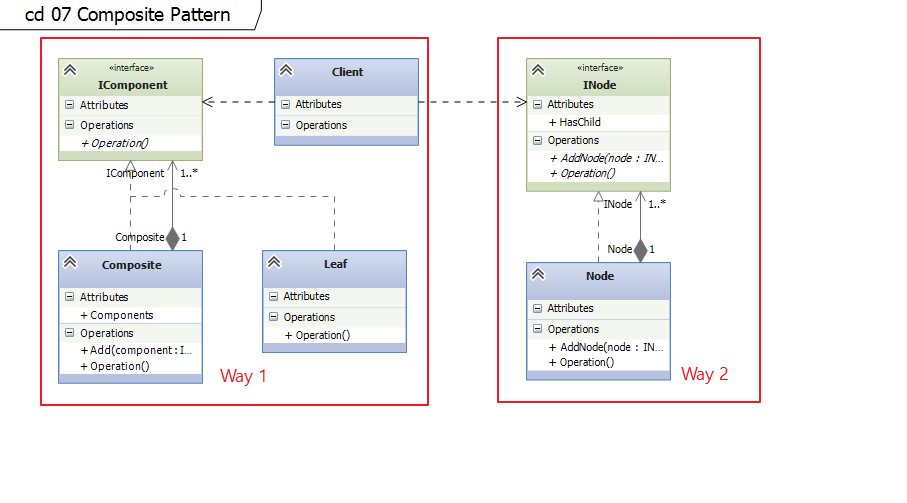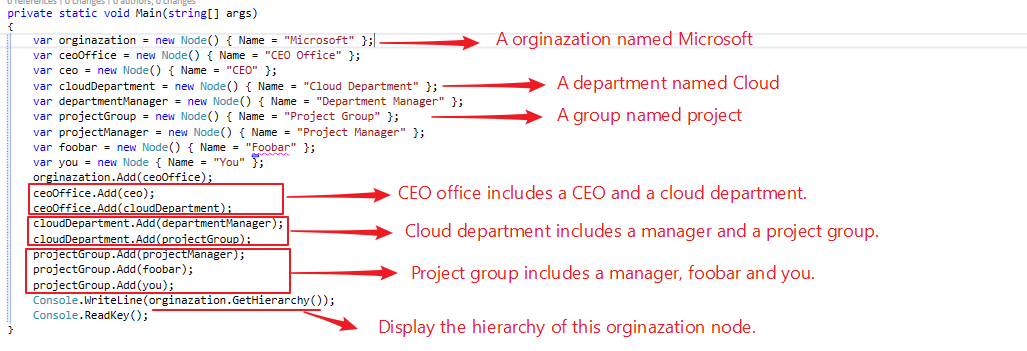静悄悄中时间飞逝,感叹一句最近TMD真忙真累,好在天生坚强性格阳光,不吹不黑,下面开始讲结构型模式(Structural patterns)的第2篇,Composite Pattern,中文称之为组合或复合模式。
定义:
Composite模式,能够灵活地实现循环、递归、部分-整体类的结构,使外部世界能够以一致的方式处理单体或集合。
解决的问题:
- 就像定义中所提及的那样,如何使客户端能够以一致的方式去访问某个单体或者集合,以使结构更加简洁
- 如何优雅的表达一个树形结构
怎么去解决(包含叶子Leaf的实现方式):
- 通过定义一个接口代表集合与个体所拥有的相同属性与行为,如IComponent
- 通过定义一个类Composite,它继承自IComponent,同时通过组合的方式它拥有一个名称为Components的属性,它代表着一个IComponent集合
- Composite有能力将一个实现了IComponent接口的对象加入到Components中
- 对于Composite的任何请求,都会被重定向到属性Components中的每个个体分别去执行
- 通过定义一个类Leaf,它继承自IComponent,代表着不可再分割的个体
举个栗子,在一个树状结构中,树杆、树枝、树叉皆由Composite来表示,而Leaf代表的是末端的每片树叶。
怎么去解决(进一步抽象):
通过分析我们能够发现在上面的解决方式中,如果有能力分辨一个IComponent是树杆还是树叶,便可以将Composite和Leaf合并为一个类型,于是我们为IComponent引入一个新的属性HasChild,并且给它换一个更贴切的名字INode,如果HasChild为True,则代表它是Composite,反之则代表它是Leaf
- 通过定义一个接口代表集合与个体所拥有的相同属性与行为,如INode,该接口拥有一个称为HasChild的布尔属性
- 通过定义一个类Node,它继承自INode,同时通过组合的方式它拥有一个名称为Nodes的属性,它代表着一个INode集合
- Node有能力添加一个实现了INode接口的对象到Nodes中
- 对于Node的任何请求,如果HasChild为True,那么请求会被重定向到属性Nodes的每一个个体分别去执行,如果HasChild为False,那么请求将由自身进行处理
UML:

实例:
using System;
using System.Collections.Generic;
using System.Collections.ObjectModel;
using System.Linq;
namespace CompositePattern
{
internal class Program
{
private static void Main(string[] args)
{
var orginazation = new Node() { Name = "Microsoft" };
var ceoOffice = new Node() { Name = "CEO Office" };
var ceo = new Node() { Name = "CEO" };
var cloudDepartment = new Node() { Name = "Cloud Department" };
var departmentManager = new Node() { Name = "Department Manager" };
var projectGroup = new Node() { Name = "Project Group" };
var projectManager = new Node() { Name = "Project Manager" };
var foobar = new Node() { Name = "Foobar" };
var you = new Node { Name = "You" };
orginazation.Add(ceoOffice);
ceoOffice.Add(ceo);
ceoOffice.Add(cloudDepartment);
cloudDepartment.Add(departmentManager);
cloudDepartment.Add(projectGroup);
projectGroup.Add(projectManager);
projectGroup.Add(foobar);
projectGroup.Add(you);
Console.WriteLine(orginazation.GetHierarchy());
Console.ReadKey();
}
}
/// <summary>
/// Node
/// </summary>
public interface INode
{
string Name { get; set; }
/// <summary>
/// Adds the specified node.
/// </summary>
/// <param name="node">The node.</param>
void Add(INode node);
/// <summary>
/// Gets the hierarchy.
/// </summary>
/// <returns></returns>
string GetHierarchy();
/// <summary>
/// Gets a value indicating whether this instance has child node.
/// </summary>
/// <value>
/// <c>true</c> if this instance has child; otherwise, <c>false</c>.
/// </value>
bool HasChild { get; }
/// <summary>
/// Gets the child nodes.
/// </summary>
/// <value>
/// The nodes.
/// </value>
ICollection<INode> Nodes { get; }
/// <summary>
/// Gets or sets the parent.
/// </summary>
/// <value>
/// The parent.
/// </value>
INode Parent { get; set; }
}
public class Node : INode
{
public bool HasChild { get { return Nodes.Any(); } }
public string Name { get; set; }
public ICollection<INode> Nodes { get; } = new Collection<INode>();
public INode _parent;
public INode Parent { get { return _parent; } set { if (_parent != null) throw new Exception("The parent only can be set up once."); _parent = value; } }
public void Add(INode node)
{
Nodes.Add(node);
node.Parent = this;
}
private int GetFloorNumber(INode node, int floors = 0)
{
if (node != null)
{
floors++;
return GetFloorNumber(node.Parent, floors);
}
return floors;
}
public string GetHierarchy()
{
var indents = string.Empty;
var floorNumber = GetFloorNumber(this);
for (int i = 0; i < floorNumber; i++)
{
indents = $">{indents}";
}
var result = $"{indents} {Name}";
if (HasChild)
{
foreach (var item in Nodes)
{
var childName = item.GetHierarchy();
result = $"{result}{Environment.NewLine}{childName}";
}
}
return $"{result}";
}
}
}
注释:


输出:

